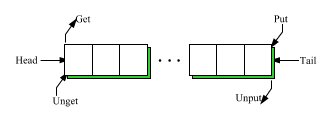
|
|
This group of functions treats a List as a queue.
The primary operators are
put() and get(),
which correspond to << and
>> on streams.
We also supply
unput() and unget(),
which make it possible to use a List as a stack or deque.
In addition, head() and
tail() can be used to examine the elements at the
beginning and at the end of the List without removing them.
Figure 1 shows the relationships
of the queue-oriented functions.
They allow new Ts to be added or removed at either
end of the List<T>.
put() and unget(),
the operators that add Ts to the List, can also take List<T>
arguments, so they serve as append and prepend operators
(correspondingly) as well.

Queue-oriented functions
L.head() returns a pointer to the element
at the head of the List L.
If the List is empty, zero will be returned.
L.tail() returns a pointer to the element
at the tail of the List L.
If the List is empty, zero will be returned.
L.put(t) puts T t
on the end of List L and L.put(l)
appends List l to
L.
put() returns its updated object so
L.put(t1).put(t2) will append t1
and t2 to
L.
If L is non-empty, L.get(t)
gets (and removes) the first element from L, assigns
it to t, and returns TRUE.
Otherwise, L and t are unchanged,
and the return value is FALSE.
L.unget(t) undoes the effect of
L.get(t) (which removes the first character from
L); that is, it puts t
back on the front (got that?) of L.
In another
sense, unget() is the reverse of
put() since it prepends rather than appends to
its object.
The type rules are exactly the same as for put().
unget() returns its object.
L.unput(t) undoes the effect of
L.put(t) (which appends t
to L); that is, it gets (and removes) the last
element from
L, and assigns it to t.
Similarly, in another sense, unput() is the reverse
of
get() since it removes the last (instead of the
first) element of its List.
Versions of get() and unput()
exist that do not take an argument.
They remove an element from the List and return
it, if the List is non-empty.
If the List is empty, this is considered a program
bug and the result may be unexpected (see "Error handling" below).
It is the
application's responsibility to make sure that the List is not empty.
The original remove() function at the beginning
of the paper is an example of the use of put()
and get().
A stack can be easily constructed using
put() and unput()
in the following way:
class int_stack : List<int>
{
public:
int_stack() {}
~int_stack() {}
int empty() { return length() == 0; }
int pop() { int x; if (!unput(x)) error();
else return x; }
void push(int x) { put(x); }
};
Clearly, unget() and get()
could have been used instead of
put() and unput().